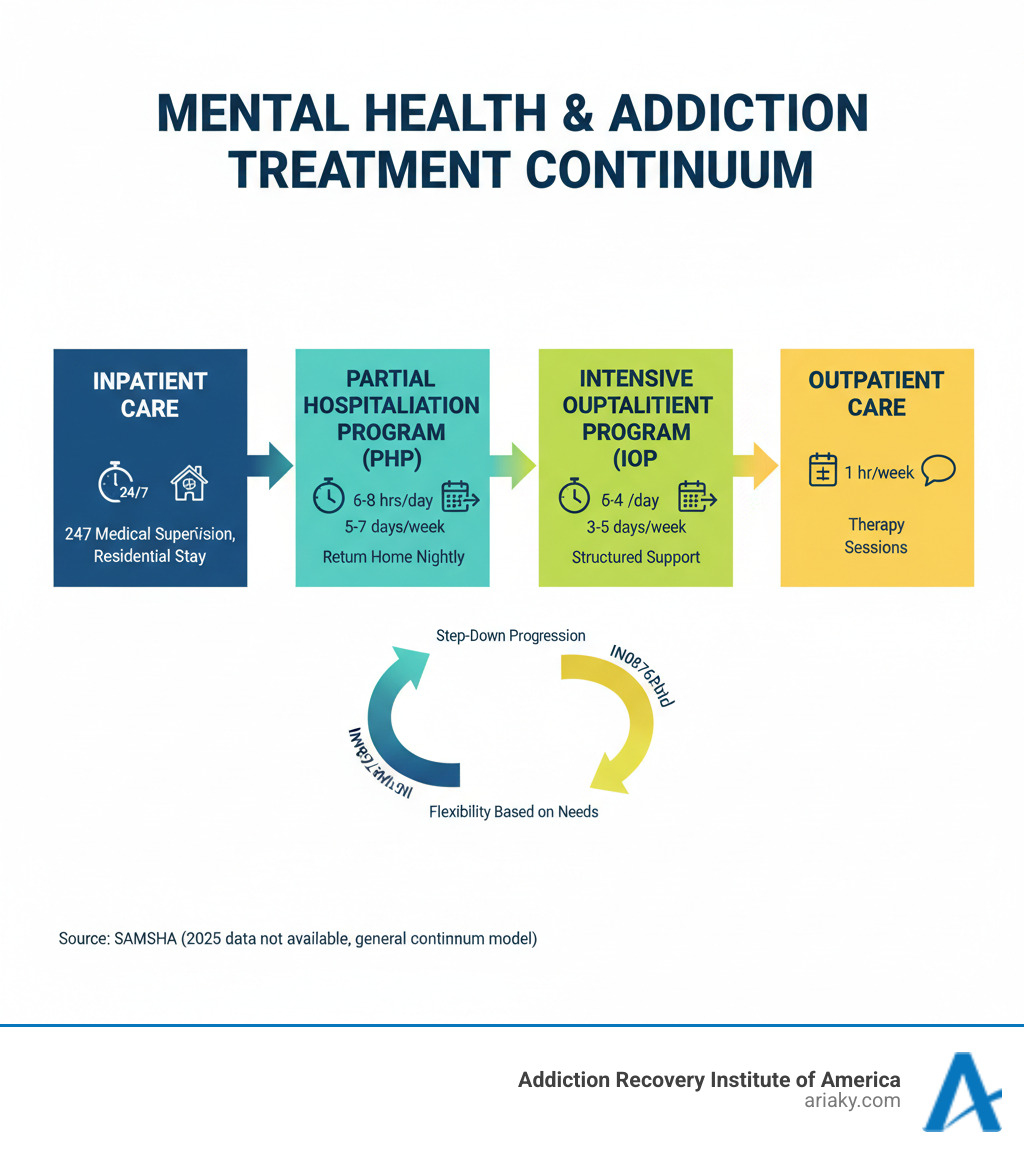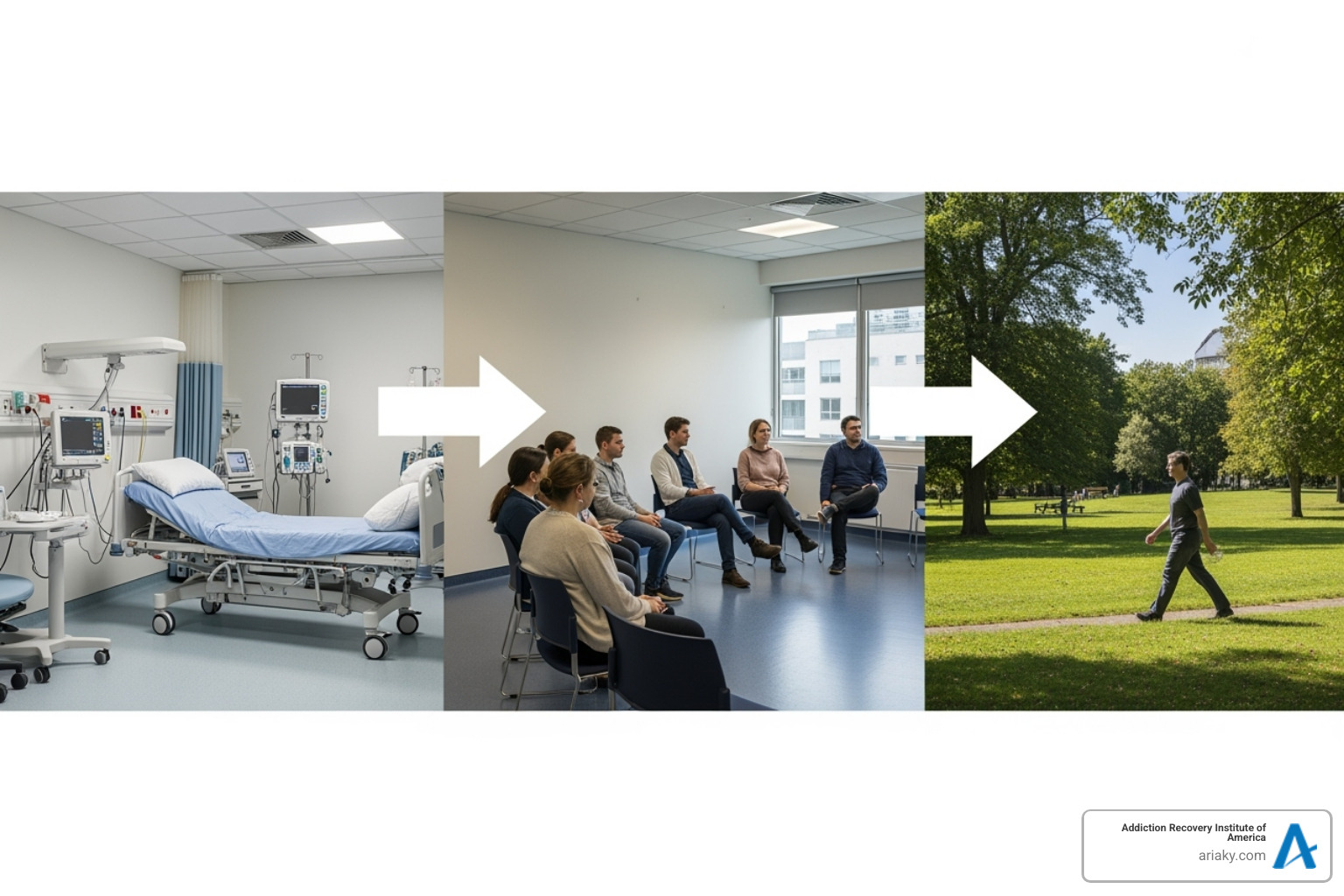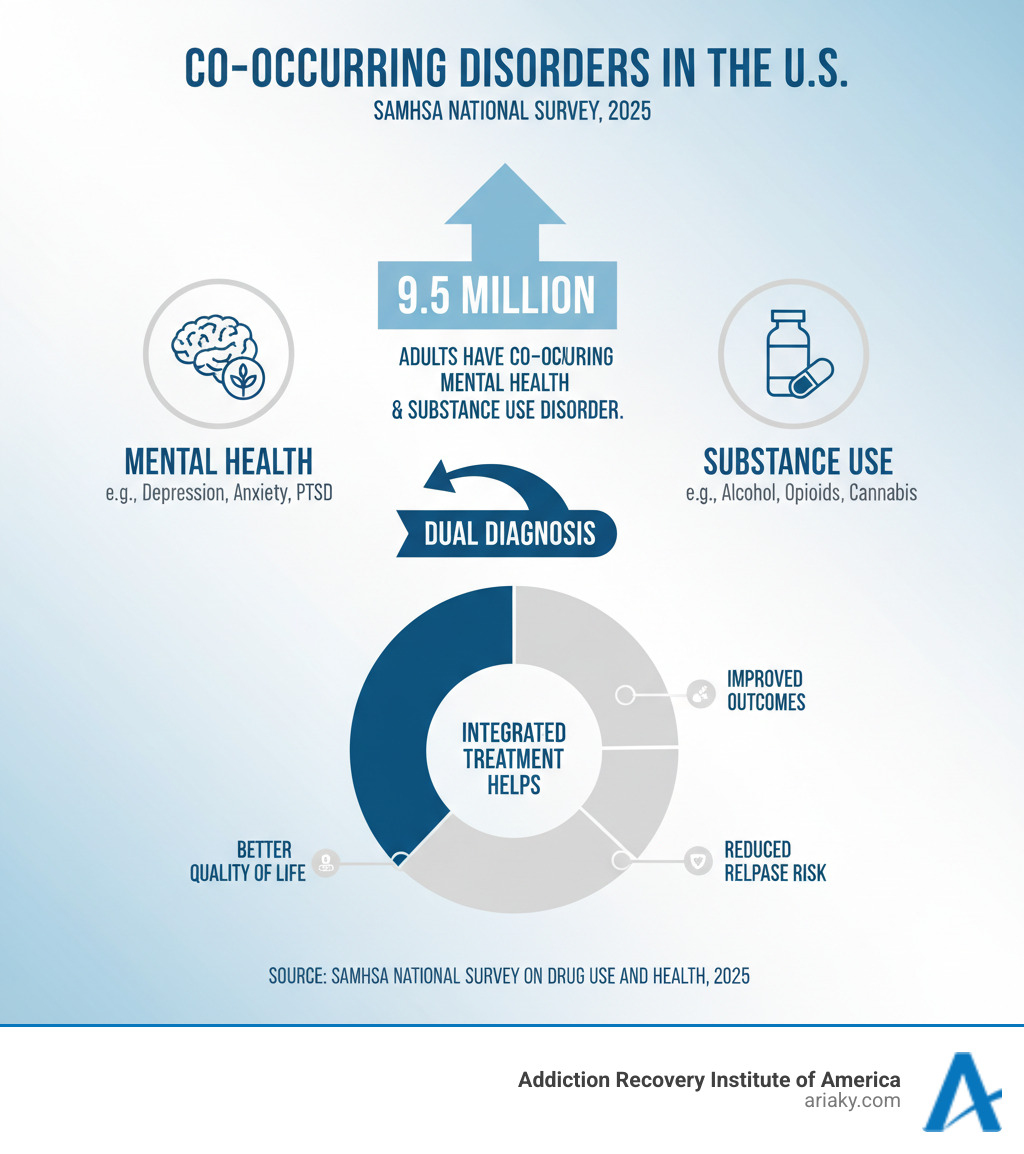Understanding PHP: A Bridge Between Hospital and Home
What is PHP treatment in the context of addiction and mental health recovery? PHP stands for Partial Hospitalization Program—a structured, intensive treatment option that provides hospital-level care during the day while allowing you to return home each evening.
Quick Answer:
- Definition: A day treatment program offering intensive therapy and medical supervision without overnight stays.
- Time Commitment: Typically 5-7 days per week, 6-8 hours per day.
- Purpose: Provides more support than regular outpatient care but is less restrictive than inpatient hospitalization.
- Who It’s For: Individuals needing intensive treatment who have a stable, supportive home environment.
- Key Benefit: Receive comprehensive care while maintaining connections to family and daily life.
When navigating recovery, the alphabet soup of treatment options—inpatient, outpatient, IOP, PHP—can be confusing. PHP treatment fills a crucial gap, offering a middle ground for those who need more than weekly therapy but don’t require 24-hour medical supervision. According to SAMHSA, about 9.5 million people in the US have both a mental health disorder and a substance use disorder, and many benefit from the structured-yet-flexible approach of a PHP.
Think of PHP as a bridge. It helps people transition safely from inpatient care back to everyday life, or it serves as an intensive starting point for those who need significant support but can safely manage their evenings and nights at home.

What is a Partial Hospitalization Program (PHP)?
When facing significant mental health or addiction challenges, an hour of therapy per week may not be enough. What is PHP treatment, exactly? It’s an intensive day program that provides hospital-level care without requiring an overnight stay. You spend a significant part of your day—usually six to eight hours—in therapy and skill-building, then return home in the evening.
This model is therapeutic in itself. While receiving intensive support, you practice new coping skills in your real-world environment each evening. PHP is designed for individuals who need more structure than traditional outpatient care but do not require the 24/7 medical supervision of an inpatient facility. It provides the intensity you need while maintaining the independence that supports long-term recovery.

What is PHP Treatment and Its Core Purpose?
At ARIA Kentucky, our PHP treats serious mental health conditions, addiction, and co-occurring disorders. The core purpose is to provide intensive treatment that prevents the need for hospitalization or helps you transition safely after an inpatient stay.
For many, PHP serves as step-down care after a residential program, offering a structured bridge back to daily life. For others, it’s step-up care when regular outpatient sessions aren’t enough to manage worsening symptoms. This model allows people to receive robust clinical care while sleeping at home, maintaining family connections, and practicing recovery skills in their real environment.
To learn more about the therapeutic approaches we integrate into our PHP and other programs, explore our Addiction Treatment Therapy Programs.
A Typical Day in a PHP
A day in PHP is a full-time commitment to your healing. Programs typically run five to seven days per week, with each day lasting six to eight hours. This intensity is what makes PHP so effective.
Your day is a structured schedule of therapeutic activities:
- Group therapy forms the backbone of the day, providing a safe space to share experiences and gain insights from peers.
- Individual therapy offers one-on-one time with a therapist to work on personal issues and develop customized coping strategies.
- Psycho-educational groups teach you about the science of addiction and mental health, empowering you with knowledge to make better choices.
- Skill-building activities provide practical tools like mindfulness, distress tolerance, and communication techniques that you can use immediately.
- Medication check-ins with medical staff ensure your psychiatric medications are working effectively with minimal side effects.
At the end of the day, you go home to practice what you’ve learned, with the confidence that you’ll be back for more support tomorrow.
Therapies and Components Offered in PHP
Our PHP integrates multiple evidence-based therapies to treat the whole person:
- Cognitive Behavioral Therapy (CBT) helps you identify and change negative thought patterns.
- Dialectical Behavior Therapy (DBT) teaches skills for managing intense emotions and distress.
- Individual and Group Therapy provide a mix of personalized attention and peer support.
- Family Therapy helps repair relationships and builds a strong support system at home.
- Medication Management ensures your psychiatric medications are optimized for your needs.
- Psychoeducation empowers you with knowledge about your condition and the recovery process.
- Experiential Therapies like art, music, or yoga offer alternative ways to process emotions.
- Life Skills Training addresses practical challenges like vocational guidance or time management.
- Peer Support connects you with community resources like 12-step programs for ongoing encouragement.
- Aftercare Planning begins on day one to create a detailed plan for maintaining progress after you complete the program.
This comprehensive approach helps you build a life rich with meaning, connection, and purpose. To learn more, visit our page on Substance Abuse Treatment Kentucky.
PHP vs. Other Levels of Care
Mental health and addiction treatment exists on a continuum of care, with different levels designed to meet you where you are. What is PHP treatment in this context? It’s the crucial middle ground, offering more support than weekly therapy but less restriction than living at a facility.
Treatment intensity ranges from most restrictive (24/7 inpatient care) to least restrictive (occasional therapy check-ins). PHP sits in the middle, providing substantial medical supervision and therapeutic support while respecting your patient autonomy. This allows you to practice recovery skills in real-world situations each evening while having a comprehensive support system to return to each day.

How PHP Differs from Inpatient/Residential Care
The biggest difference is where you sleep. In inpatient or residential programs, you live at the facility with 24/7 supervision. This is necessary for medical detox, acute mental health crises, or if your home environment is unsafe.
PHP provides the same daily therapeutic intensity—6 to 8 hours—but you return home each evening. This is not just for comfort; it’s a core part of the therapy. It allows you to apply what you’re learning in your actual living environment. For many, PHP is an essential step-down from inpatient care, providing a bridge that maintains intensive support while gradually increasing your level of independence.
If you’re curious about residential options that might precede PHP, learn more at our Rehab Facilities in Kentucky page.
PHP vs. Intensive Outpatient Program (IOP)
The next step down from PHP is often an Intensive Outpatient Program (IOP). Both are outpatient programs, but they differ in time commitment and intensity.
| Feature | Partial Hospitalization Program (PHP) | Intensive Outpatient Program (IOP) |
|---|---|---|
| Hours per Week | 20-30+ hours (typically 6-8 hours per day) | 9-12 hours (typically 2-4 hours per day) |
| Days per Week | 5-7 days per week | 3-5 days per week |
| Treatment Intensity | Highly intensive, more medical oversight | Moderately intensive, less medical oversight |
| Ideal Candidate | Needs significant support, transitioning from inpatient, unstable at lower levels of care | Needs structured support but can maintain daily responsibilities, stable after PHP |
| Flexibility | Less flexible due to high time commitment | More flexible, allowing for work or school |
| Purpose | Avert hospitalization, step-down from inpatient | Step-down from PHP, relapse prevention |
PHP requires a full-time time commitment focused on recovery, which is ideal when symptoms are severe. IOP offers more flexibility for work or school, as the time commitment is lower. The typical progression is inpatient → PHP → IOP → outpatient, with each step granting more freedom as you become more stable. This continuum is flexible, allowing you to step up or down in care as your needs change.
To learn more about IOP, visit our Intensive Outpatient Program (IOP) Kentucky page.
Who is an Ideal Candidate for PHP Treatment?
Choosing the right level of care is a critical, personal decision. When considering what is PHP treatment can offer, we start with a thorough patient assessment. We evaluate your medical stability, motivation for recovery, and whether you have co-occurring disorders to match you with the level of support that will best facilitate your healing.
Criteria for Admission to a PHP
PHP is a powerful option, but it works best when certain conditions are met. An ideal candidate generally has:
- A stable living situation that is reasonably safe and supportive.
- Medical stability, meaning you don’t require 24/7 medical monitoring or are in acute crisis.
- Transportation access to commute to the facility 5-7 days a week.
- A need for structure that is more intensive than weekly therapy but less than 24/7 supervision.
- A willingness to participate in daily therapeutic activities, even when motivation is low.
We work with you to evaluate these factors compassionately. If PHP isn’t the right fit now, we’ll guide you to the level of care that is. Explore options at our Drug Treatment Centers in Kentucky.
Who Benefits from What is PHP Treatment?
So who thrives in a PHP? What is PHP treatment particularly effective for? It’s ideal for anyone needing intensive, daily support who can safely return home at night.
You may be a great candidate if you are:
- Struggling with mental health disorders like severe depression, anxiety, PTSD, or bipolar disorder.
- Dealing with substance use disorders and need structured support after detox to build a foundation for sobriety.
- Diagnosed with co-occurring disorders (dual diagnosis), as PHP is designed to treat both mental health and addiction simultaneously.
- Transitioning from an inpatient or residential program and need a supportive bridge back to daily life.
- Finding that weekly therapy isn’t enough to manage your symptoms and maintain daily responsibilities.
PHP helps individuals understand their illness, develop effective coping skills, and improve functioning at work, home, and in relationships. For more on our integrated approach, visit our Kentucky Substance Abuse Treatment Center page.
Benefits and Considerations of PHP
Making an informed decision means understanding the pros and cons of each treatment option. What is PHP treatment really offering, and is it the right fit for your situation? Let’s explore the advantages and honest considerations of a Partial Hospitalization Program.

The Advantages of Choosing a PHP
PHP offers a unique balance of intensive care without completely disconnecting you from your life. Key advantages include:
- Cost-Effectiveness: By eliminating the cost of 24/7 room and board, PHP provides hospital-level care at a more accessible price point.
- Applying Skills in Real-Time: You learn coping skills during the day and practice them in your home environment that same evening, reinforcing learning.
- Maintaining Family Connections: Staying at home allows you to maintain crucial emotional support from loved ones who are part of your daily recovery journey.
- Intensive Support Without a Residential Stay: You receive comprehensive therapy, medical supervision, and skill-building while keeping the routines that ground you.
- Reduced Relapse Risk: The structured support helps build a strong recovery foundation while you practice managing triggers in your regular life.
- Continuity of Care: PHP serves as a seamless bridge, whether you’re stepping down from inpatient care or stepping up from weekly therapy.
Potential Drawbacks and Limitations
It’s important to be realistic about what PHP requires. Consider these potential challenges:
- Significant Time Commitment: Attending treatment for 6-8 hours a day, 5-7 days a week, is a full-time job that can interfere with work or school.
- Not Suitable for Severe Instability: If you are in acute crisis, experiencing dangerous withdrawal, or are a danger to yourself or others, 24/7 inpatient care is necessary first.
- Requires a Safe Home Environment: The program’s success depends on having a stable and supportive place to return to each night, free from major triggers or chaos.
- Personal Responsibility: PHP requires more self-motivation than inpatient care, as you manage your own evenings and mornings.
- Logistical Challenges: Reliable transportation and childcare can be practical problems that require planning.
Our team at ARIA Kentucky can help you weigh these factors to find the right level of care. For more information, visit our Kentucky Drug & Alcohol Rehab Programs page.
Finding a Quality Program and Understanding Costs
Choosing the right PHP facility and understanding the costs are crucial steps in your recovery journey. We’re here to help you steer these decisions with clarity.
What to Look for in a PHP Facility
Not all PHPs are the same. When evaluating what is PHP treatment at any facility, look for these markers of excellence:
- Accreditation and Licensing: The facility should be accredited by a national body like CARF or The Joint Commission and hold all necessary state licenses. ARIA Kentucky is a proud, AODE-certified addiction rehab center.
- Licensed, Multidisciplinary Team: The staff should include licensed professionals like psychiatrists, therapists (LADC, LPC, etc.), and nurses.
- Evidence-Based Practices: The program must use scientifically proven therapies like CBT, DBT, and trauma-informed care.
- Individualized Treatment Plans: Quality programs conduct a comprehensive assessment to create a plan custom to your unique needs and goals.
- Aftercare Planning: A great program emphasizes discharge planning from day one, connecting you with ongoing support to prevent relapse.
- Specialized Services: Ask if the facility offers specialized tracks for co-occurring disorders, trauma, or other specific needs.
How PHP Cost is Determined
We are committed to financial transparency. The cost of PHP varies based on program length, geographic location, and the range of included services.
Here’s how to manage the cost:
- Insurance Verification: This is your first step. Most private insurance plans, as well as Medicare and Kentucky Medicaid, provide coverage for PHP. Our admissions team can help verify your benefits.
- Out-of-Pocket Costs: Be aware of potential co-pays, deductibles, or other costs not covered by insurance. We are upfront about these expenses.
- Payment Options: If you have costs not covered by insurance, many facilities, including ours, offer flexible payment plans or financial assistance for those who qualify.
We never want finances to be a barrier to care. Our team will explore all options with you. For more information on our programs, visit our Kentucky Drug & Alcohol Rehab Programs page.
Conclusion
So, what is PHP treatment? It’s more than an acronym; it’s a lifeline. It is a bridge for those who need intensive support while staying connected to home and family. A Partial Hospitalization Program offers the perfect balance between the 24/7 structure of inpatient care and the independence of traditional outpatient therapy.
You receive hospital-level care during the day—comprehensive therapy, medical supervision, and peer support—and return home each evening to practice what you’ve learned in the real world. This is where lasting change takes root.
At ARIA Kentucky, we are an accredited, AODE-certified addiction rehab center committed to providing individualized care. We offer a full continuum of custom drug and alcohol treatment programs, including detox, residential, PHP, and IOP, designed to meet you where you are.
Taking the first step can feel overwhelming, but you don’t have to do it alone. Our team is here to empower you with the tools, compassion, and support needed to build a healthier life. If you or a loved one needs a structured, supportive environment that honors both the intensity of treatment and the importance of daily life, we invite you to reach out.
Learn more about our Partial Hospitalization Program (PHP) in Kentucky


